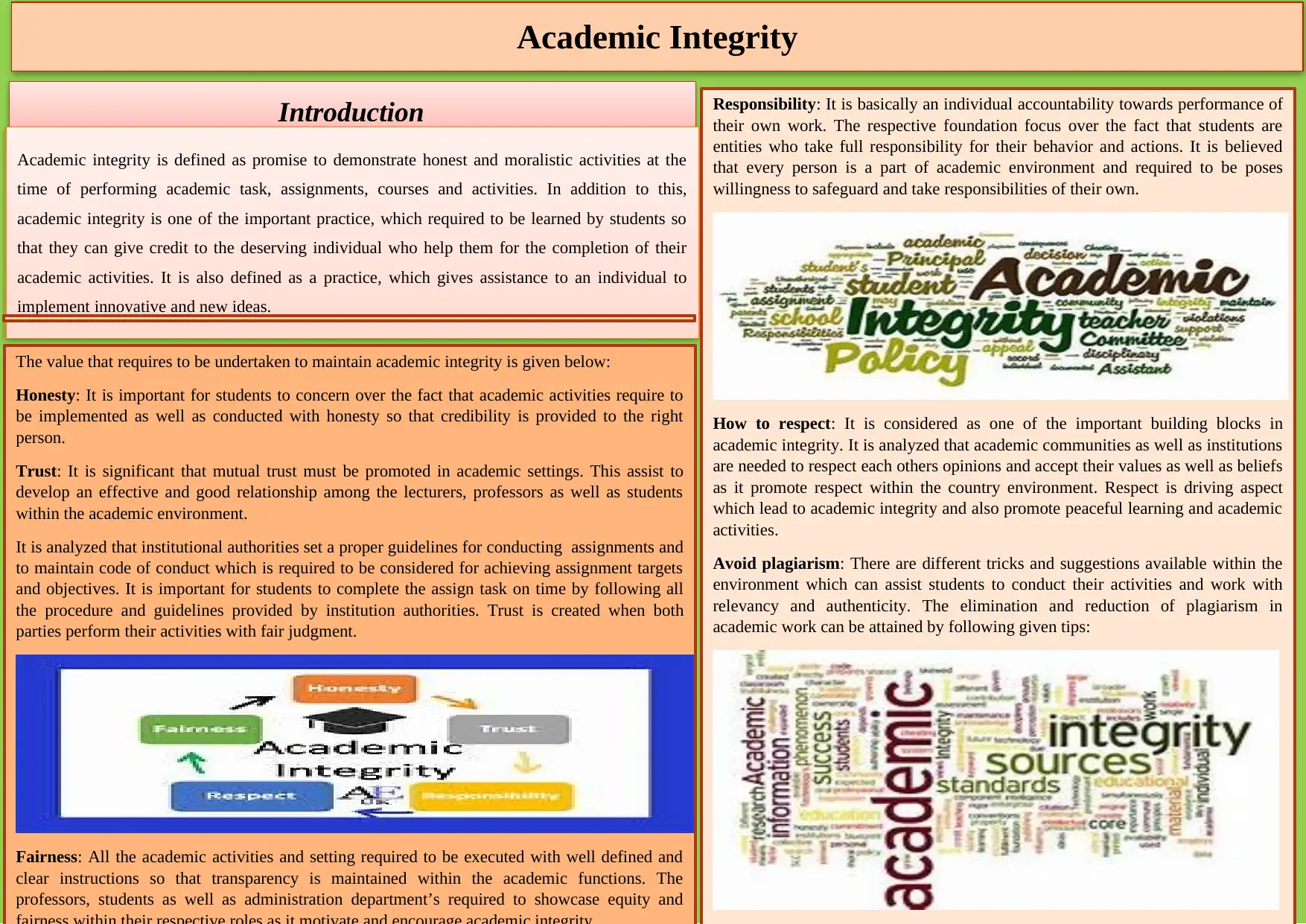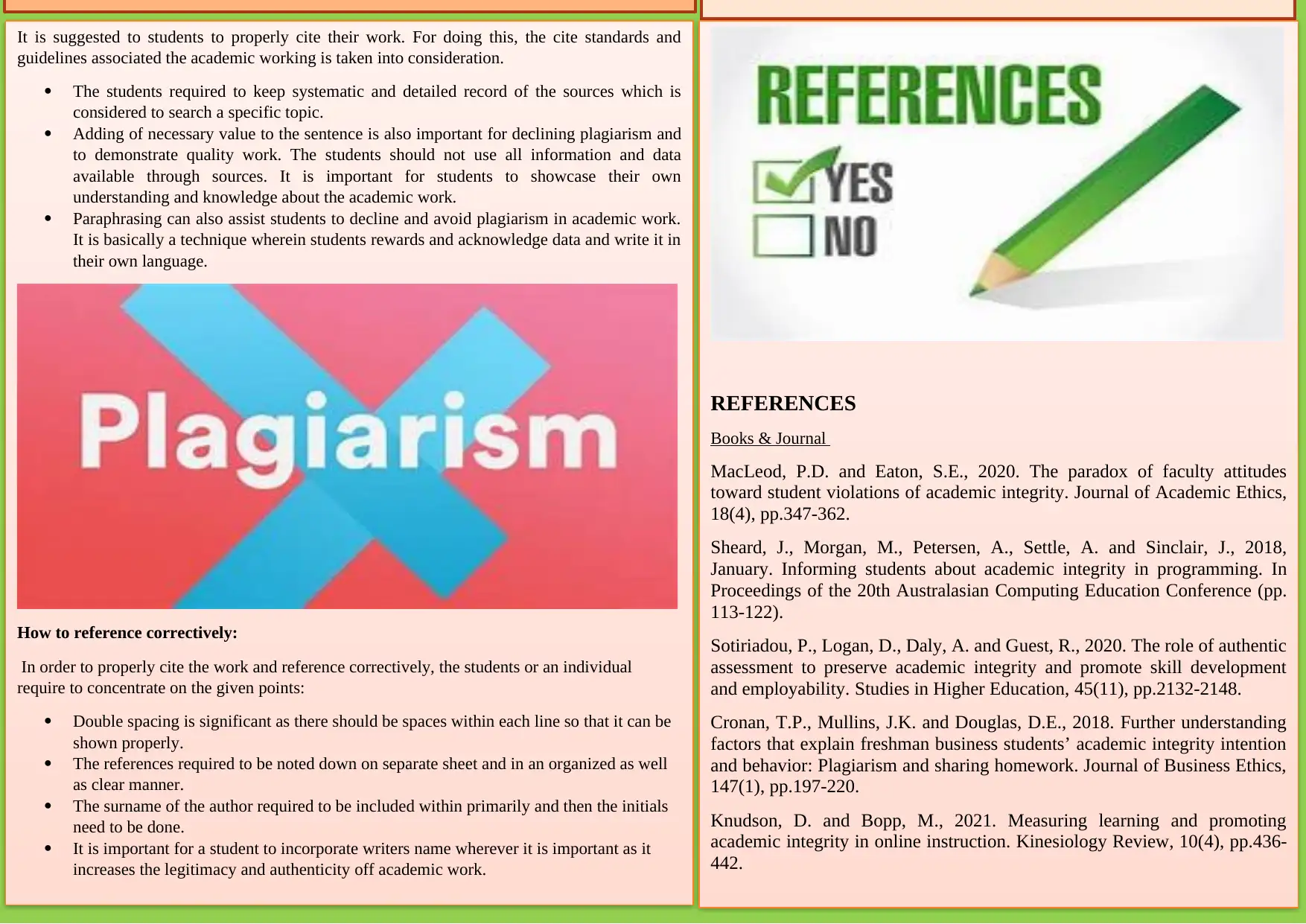Academic Integrity in Higher Education: Promoting Honesty and Trust
VerifiedAdded on 2023/06/18
|2
|932
|467
Essay
AI Summary
This essay explores the concept of academic integrity, defining it as a commitment to honest and moral behavior in academic pursuits. It highlights the importance of responsibility and the need for students to take ownership of their work. The essay emphasizes core values such as honesty, trust, fairness, and respect, which are essential for fostering a positive academic environment. It provides practical advice on avoiding plagiarism, including proper citation, detailed record-keeping, adding original insights, and paraphrasing techniques. The essay also stresses the significance of correct referencing, including double spacing, organized reference lists, and accurate author attribution. The discussed research articles highlight the factors influencing academic integrity and methods for promoting it in online and traditional learning environments.

Academic Integrity
Introduction
Academic integrity is defined as promise to demonstrate honest and moralistic activities at the
time of performing academic task, assignments, courses and activities. In addition to this,
academic integrity is one of the important practice, which required to be learned by students so
that they can give credit to the deserving individual who help them for the completion of their
academic activities. It is also defined as a practice, which gives assistance to an individual to
implement innovative and new ideas.
Responsibility: It is basically an individual accountability towards performance of
their own work. The respective foundation focus over the fact that students are
entities who take full responsibility for their behavior and actions. It is believed
that every person is a part of academic environment and required to be poses
willingness to safeguard and take responsibilities of their own.
How to respect: It is considered as one of the important building blocks in
academic integrity. It is analyzed that academic communities as well as institutions
are needed to respect each others opinions and accept their values as well as beliefs
as it promote respect within the country environment. Respect is driving aspect
which lead to academic integrity and also promote peaceful learning and academic
activities.
Avoid plagiarism: There are different tricks and suggestions available within the
environment which can assist students to conduct their activities and work with
relevancy and authenticity. The elimination and reduction of plagiarism in
academic work can be attained by following given tips:
The value that requires to be undertaken to maintain academic integrity is given below:
Honesty: It is important for students to concern over the fact that academic activities require to
be implemented as well as conducted with honesty so that credibility is provided to the right
person.
Trust: It is significant that mutual trust must be promoted in academic settings. This assist to
develop an effective and good relationship among the lecturers, professors as well as students
within the academic environment.
It is analyzed that institutional authorities set a proper guidelines for conducting assignments and
to maintain code of conduct which is required to be considered for achieving assignment targets
and objectives. It is important for students to complete the assign task on time by following all
the procedure and guidelines provided by institution authorities. Trust is created when both
parties perform their activities with fair judgment.
Fairness: All the academic activities and setting required to be executed with well defined and
clear instructions so that transparency is maintained within the academic functions. The
professors, students as well as administration department’s required to showcase equity and
Introduction
Academic integrity is defined as promise to demonstrate honest and moralistic activities at the
time of performing academic task, assignments, courses and activities. In addition to this,
academic integrity is one of the important practice, which required to be learned by students so
that they can give credit to the deserving individual who help them for the completion of their
academic activities. It is also defined as a practice, which gives assistance to an individual to
implement innovative and new ideas.
Responsibility: It is basically an individual accountability towards performance of
their own work. The respective foundation focus over the fact that students are
entities who take full responsibility for their behavior and actions. It is believed
that every person is a part of academic environment and required to be poses
willingness to safeguard and take responsibilities of their own.
How to respect: It is considered as one of the important building blocks in
academic integrity. It is analyzed that academic communities as well as institutions
are needed to respect each others opinions and accept their values as well as beliefs
as it promote respect within the country environment. Respect is driving aspect
which lead to academic integrity and also promote peaceful learning and academic
activities.
Avoid plagiarism: There are different tricks and suggestions available within the
environment which can assist students to conduct their activities and work with
relevancy and authenticity. The elimination and reduction of plagiarism in
academic work can be attained by following given tips:
The value that requires to be undertaken to maintain academic integrity is given below:
Honesty: It is important for students to concern over the fact that academic activities require to
be implemented as well as conducted with honesty so that credibility is provided to the right
person.
Trust: It is significant that mutual trust must be promoted in academic settings. This assist to
develop an effective and good relationship among the lecturers, professors as well as students
within the academic environment.
It is analyzed that institutional authorities set a proper guidelines for conducting assignments and
to maintain code of conduct which is required to be considered for achieving assignment targets
and objectives. It is important for students to complete the assign task on time by following all
the procedure and guidelines provided by institution authorities. Trust is created when both
parties perform their activities with fair judgment.
Fairness: All the academic activities and setting required to be executed with well defined and
clear instructions so that transparency is maintained within the academic functions. The
professors, students as well as administration department’s required to showcase equity and
Paraphrase This Document
Need a fresh take? Get an instant paraphrase of this document with our AI Paraphraser

It is suggested to students to properly cite their work. For doing this, the cite standards and
guidelines associated the academic working is taken into consideration.
The students required to keep systematic and detailed record of the sources which is
considered to search a specific topic.
Adding of necessary value to the sentence is also important for declining plagiarism and
to demonstrate quality work. The students should not use all information and data
available through sources. It is important for students to showcase their own
understanding and knowledge about the academic work.
Paraphrasing can also assist students to decline and avoid plagiarism in academic work.
It is basically a technique wherein students rewards and acknowledge data and write it in
their own language.
How to reference correctively:
In order to properly cite the work and reference correctively, the students or an individual
require to concentrate on the given points:
Double spacing is significant as there should be spaces within each line so that it can be
shown properly.
The references required to be noted down on separate sheet and in an organized as well
as clear manner.
The surname of the author required to be included within primarily and then the initials
need to be done.
It is important for a student to incorporate writers name wherever it is important as it
increases the legitimacy and authenticity off academic work.
REFERENCES
Books & Journal
MacLeod, P.D. and Eaton, S.E., 2020. The paradox of faculty attitudes
toward student violations of academic integrity. Journal of Academic Ethics,
18(4), pp.347-362.
Sheard, J., Morgan, M., Petersen, A., Settle, A. and Sinclair, J., 2018,
January. Informing students about academic integrity in programming. In
Proceedings of the 20th Australasian Computing Education Conference (pp.
113-122).
Sotiriadou, P., Logan, D., Daly, A. and Guest, R., 2020. The role of authentic
assessment to preserve academic integrity and promote skill development
and employability. Studies in Higher Education, 45(11), pp.2132-2148.
Cronan, T.P., Mullins, J.K. and Douglas, D.E., 2018. Further understanding
factors that explain freshman business students’ academic integrity intention
and behavior: Plagiarism and sharing homework. Journal of Business Ethics,
147(1), pp.197-220.
Knudson, D. and Bopp, M., 2021. Measuring learning and promoting
academic integrity in online instruction. Kinesiology Review, 10(4), pp.436-
442.
guidelines associated the academic working is taken into consideration.
The students required to keep systematic and detailed record of the sources which is
considered to search a specific topic.
Adding of necessary value to the sentence is also important for declining plagiarism and
to demonstrate quality work. The students should not use all information and data
available through sources. It is important for students to showcase their own
understanding and knowledge about the academic work.
Paraphrasing can also assist students to decline and avoid plagiarism in academic work.
It is basically a technique wherein students rewards and acknowledge data and write it in
their own language.
How to reference correctively:
In order to properly cite the work and reference correctively, the students or an individual
require to concentrate on the given points:
Double spacing is significant as there should be spaces within each line so that it can be
shown properly.
The references required to be noted down on separate sheet and in an organized as well
as clear manner.
The surname of the author required to be included within primarily and then the initials
need to be done.
It is important for a student to incorporate writers name wherever it is important as it
increases the legitimacy and authenticity off academic work.
REFERENCES
Books & Journal
MacLeod, P.D. and Eaton, S.E., 2020. The paradox of faculty attitudes
toward student violations of academic integrity. Journal of Academic Ethics,
18(4), pp.347-362.
Sheard, J., Morgan, M., Petersen, A., Settle, A. and Sinclair, J., 2018,
January. Informing students about academic integrity in programming. In
Proceedings of the 20th Australasian Computing Education Conference (pp.
113-122).
Sotiriadou, P., Logan, D., Daly, A. and Guest, R., 2020. The role of authentic
assessment to preserve academic integrity and promote skill development
and employability. Studies in Higher Education, 45(11), pp.2132-2148.
Cronan, T.P., Mullins, J.K. and Douglas, D.E., 2018. Further understanding
factors that explain freshman business students’ academic integrity intention
and behavior: Plagiarism and sharing homework. Journal of Business Ethics,
147(1), pp.197-220.
Knudson, D. and Bopp, M., 2021. Measuring learning and promoting
academic integrity in online instruction. Kinesiology Review, 10(4), pp.436-
442.
1 out of 2
Related Documents
Your All-in-One AI-Powered Toolkit for Academic Success.
+13062052269
info@desklib.com
Available 24*7 on WhatsApp / Email
![[object Object]](/_next/static/media/star-bottom.7253800d.svg)
Unlock your academic potential
Copyright © 2020–2026 A2Z Services. All Rights Reserved. Developed and managed by ZUCOL.



